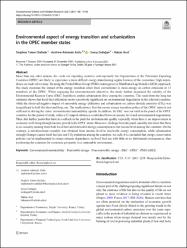| dc.contributor.author | Onifade, Stephen Taiwo | |
| dc.contributor.author | Alola, Andrew Adewale | |
| dc.contributor.author | Erdoğan, Savaş | |
| dc.contributor.author | Acet, Hakan | |
| dc.date.accessioned | 2023-06-17T07:12:07Z | |
| dc.date.available | 2023-06-17T07:12:07Z | |
| dc.date.issued | 2021 | en_US |
| dc.identifier.issn | 0944-1344 | |
| dc.identifier.issn | 1614-7499 | |
| dc.identifier.uri | https://hdl.handle.net/11363/4891 | |
| dc.description.abstract | More than any other nations, the crude oil–exporting countries and especially the Organization of the Petroleum Exporting
Countries (OPEC) are likely to experience a more difficult energy-transitioning regime because of the economies’ high dependence on crude oil revenue. By using the Pooled Mean Group (PMG) Autoregressive Distributed Lag Models (ARDL) approach,
this study examines the impact of the energy transition albeit from conventional to clean energy on carbon emissions in 11
members of the OPEC. While engaging the aforementioned objective, the study further examined the validity of the
Environmental Kuznets Curve (EKC) hypothesis amidst urbanization drive among the countries. The result from the long-run
estimates shows that fossil fuel utilization exerts a positively significant on environmental degradation in the selected countries,
while the observed negative impact of renewable energy utilization and urbanization on carbon dioxide emission (CO2) was
insignificant in both the short and long run. The implication is that the current energy transition policy of the OPEC states is not
sufficient at driving the states’ environmental sustainability agenda. In addition, the EKC was not valid in the panel of the OPEC
countries for the period of study, rather a U-shaped relation is established between income level and environmental degradation.
Thus, this further posits that there is a setback in the push for environmental quality especially when there is an improvement in
economic well-being through income growth in the OPEC states. Moreover, findings from the panel causality test show that there
is no causality running from both fossil fuel and renewable energy consumption to the income level among the countries. On the
contrary, a uni-directional causality was obtained from income level to renewable energy consumption, while urbanization
strongly Granger causes fossil fuel use and CO2 emissions among the countries. As such, it is concluded that energy conservation
policies can be implemented to reduce extreme dependence on fossil fuel use with little or no detrimental consequences, thus
positioning the countries for economic prosperity in a sustainable environment. | en_US |
| dc.language.iso | eng | en_US |
| dc.publisher | SPRINGER HEIDELBERG, TIERGARTENSTRASSE 17, D-69121 HEIDELBERG, GERMANY | en_US |
| dc.relation.isversionof | 10.1007/s11356-020-12181-1 | en_US |
| dc.rights | info:eu-repo/semantics/openAccess | en_US |
| dc.rights | Attribution-NonCommercial-NoDerivs 3.0 United States | * |
| dc.rights.uri | http://creativecommons.org/licenses/by-nc-nd/3.0/us/ | * |
| dc.subject | Environmental sustainability | en_US |
| dc.subject | Renewable energy | en_US |
| dc.subject | Non-renewable energy | en_US |
| dc.subject | EKC | en_US |
| dc.subject | OPEC | en_US |
| dc.subject | PMG/ARDL | en_US |
| dc.title | Environmental aspect of energy transition and urbanization in the OPEC member states | en_US |
| dc.type | article | en_US |
| dc.relation.ispartof | Environmental Science and Pollution Research | en_US |
| dc.department | İktisadi İdari ve Sosyal Bilimler Fakültesi | en_US |
| dc.authorid | https://orcid.org/0000-0003-1497-7835 | en_US |
| dc.authorid | https://orcid.org/0000-0001-5355-3707 | en_US |
| dc.authorid | https://orcid.org/0000-0003-4314-8657 | en_US |
| dc.identifier.volume | 28 | en_US |
| dc.identifier.issue | 14 | en_US |
| dc.identifier.startpage | 17158 | en_US |
| dc.identifier.endpage | 17169 | en_US |
| dc.relation.publicationcategory | Makale - Uluslararası Hakemli Dergi - Kurum Öğretim Elemanı | en_US |
| dc.contributor.institutionauthor | Alola, Andrew Adewale | |



















